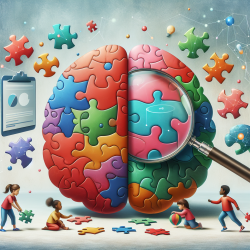Introduction
In the realm of early childhood mental health, the need for accurate and standardized diagnostic tools is paramount. The Developmental Psychiatry Diagnostic Challenges Study (DePsy) sheds light on the application and validation of the DC:0-5 classification system. This research provides valuable insights for practitioners aiming to enhance their diagnostic acumen and improve outcomes for young children.
Understanding DC:0-5
The DC:0-5 is a multiaxial classification system designed specifically for diagnosing mental disorders in early childhood. It considers the complex interplay between individual psychopathology, developmental stages, close relationships, and environmental factors. The system aims to provide a comprehensive framework for standardizing clinical practice and research in early childhood mental health.
Key Findings from the DePsy Study
The DePsy study, a multi-site clinical investigation, focuses on validating Axis I and Axis II of the DC:0-5. Conducted across six German early childhood mental health clinics, the study's main objectives include:
- Validating DC:0-5 Axis I diagnoses by comparing them with ICD-10 and clinical questionnaires.
- Describing new Axis I disorders introduced in the DC:0-5.
- Validating Axis II diagnoses using Emotional Availability Scales and parental stress self-ratings.
- Exploring the impact of parental Adverse Childhood Experiences (ACEs) and media use on child psychopathology.
Implications for Practitioners
For practitioners, the DePsy study underscores the importance of adopting the DC:0-5 classification system in clinical practice. The study's findings highlight the system's ability to provide a more nuanced understanding of early childhood mental health disorders, which can lead to more tailored and effective interventions.
Practitioners are encouraged to integrate the DC:0-5 into their diagnostic processes, leveraging its comprehensive framework to better understand the relational and environmental contexts of young patients. By doing so, they can enhance their ability to identify specific disorders and improve treatment outcomes.
Further Research and Development
While the DePsy study provides significant insights, it also opens the door for further research. Practitioners are encouraged to explore the following areas:
- The long-term impact of early childhood interventions guided by DC:0-5 diagnoses.
- The role of environmental factors, such as media use, in the development of psychopathology.
- The integration of DC:0-5 with other diagnostic systems for a holistic approach to early childhood mental health.
Conclusion
The DePsy study is a pivotal step towards standardizing and improving early childhood mental health care. By embracing the DC:0-5 classification system, practitioners can enhance their diagnostic capabilities and ultimately contribute to better developmental outcomes for young children. To delve deeper into the original research, please follow this link: Assessment and Diagnostic Classification Using DC:0-5 in Early Childhood Mental Health Clinics: The Protocol for the Developmental Psychiatry Diagnostic Challenges Study (DePsy).










